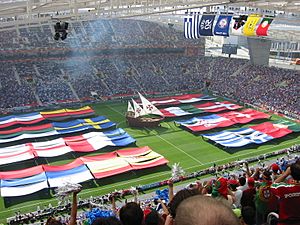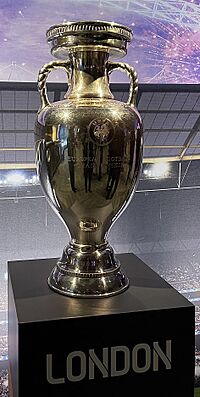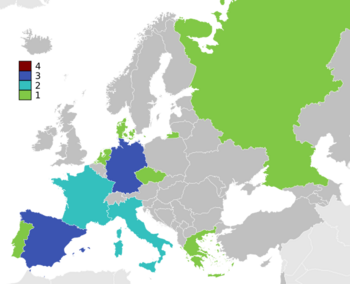UEFA European Championship facts for kids
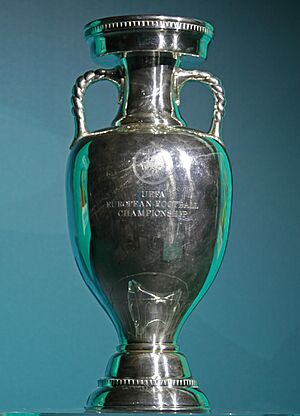
The Henri Delaunay Trophy, awarded to the winner of the UEFA European Championship
|
|
| Organising body | UEFA |
|---|---|
| Founded | 1958 |
| Region | Europe |
| Number of teams | 24 (finals) 54 (eligible to enter qualification) |
| Qualifier for | Finalissima |
| Current champions | |
| Most successful team(s) | |
The UEFA European Championship, often called the Euro or Euros, is a big football tournament organized by the Union of European Football Associations (UEFA). It's where the best men's national teams in Europe compete to see who is the champion. It's the second most-watched football event globally, right after the FIFA World Cup. For example, about 600 million people watched the Euro 2016 final.
This competition has happened every four years since 1960. The only exception was 2020, which was moved to 2021 because of the COVID-19 pandemic in Europe. It still kept the name Euro 2020. The tournament is always held in an even-numbered year, between FIFA World Cup events. It was first called the European Nations' Cup and changed to its current name in 1968. Since 1996, each tournament has been known as "UEFA Euro [year]".
To play in the Euro, teams must go through a qualifying process. The host nations automatically get a spot. Until 2016, the Euro winner could play in the FIFA Confederations Cup. Since 2020, the winner plays in the CONMEBOL–UEFA Cup of Champions.
Ten different national teams have won the seventeen European Championship tournaments. Spain has won four times, Germany has won three times, and Italy and France have won twice. Other winners include the Soviet Union, Czechoslovakia, the Netherlands, Denmark, Greece, and Portugal, each with one title. Spain is the only team to win two tournaments in a row, in 2008 and 2012.
The most recent championship was Euro 2024, held in Germany. Spain won their fourth title by beating England 2–1 in the final in Berlin.
Contents
History of the Euro Tournament
Early Years (1960–1976)
Before the Euro, there were smaller tournaments for national teams in Europe. The British Home Championship started in 1883 for teams from the United Kingdom. The Central European International Cup was held from 1927 to 1960 for teams like Austria, Hungary, and Italy.
The idea for a Europe-wide football tournament came from Henri Delaunay in 1927. He was the secretary-general of the French Football Federation. The tournament finally started in 1958, three years after Delaunay passed away. The trophy given to the winners is named the Henri Delaunay Trophy in his honor.
The first tournament in 1960 was held in France. Only four teams played in the finals, out of 17 that tried to qualify. The Soviet Union won, beating Yugoslavia 2–1 in the final in Paris. Some big teams like England and West Germany did not enter.
Spain hosted the next tournament in 1964. More teams, 29, entered the qualifying rounds. Spain beat the Soviet Union 2–1 in Madrid to win the title.
The tournament format stayed the same for the 1968 tournament, hosted and won by Italy. For the first and only time, a semi-final match was decided by a coin toss (Italy vs. Soviet Union). The final against Yugoslavia went to a replay after a 1–1 draw. Italy won the replay 2–0. More teams, 31, joined this tournament, showing its growing popularity.
Belgium hosted the 1972 tournament. West Germany won, beating the Soviet Union 3–0 in the final. This German team had many players who would also win the 1974 FIFA World Cup.
The 1976 tournament in Yugoslavia was the last with only four teams in the finals. It was also the last time the host was chosen from the qualified teams. Czechoslovakia beat West Germany in a new penalty shootout. After a miss by West Germany, Antonín Panenka scored a famous "chipped shot" penalty to win the tournament 5–3 for Czechoslovakia.
Growing to 8 Teams (1980–1992)
The competition grew to eight teams for the 1980 tournament, hosted by Italy. It included a group stage. The group winners played in the final, and the runners-up played for third place. West Germany won their second Euro title, beating Belgium 2–1.
France won their first major title at home in the 1984 tournament. Their captain, Michel Platini, scored 9 goals in just 5 games. They beat Spain 2–0 in the final. The format changed again: the top two teams from each group went to semi-finals. The match for third place was removed.
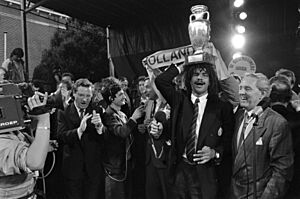
West Germany hosted UEFA Euro 1988. They lost 2–1 to their rivals, the Netherlands, in the semi-finals. The Netherlands then won the tournament, beating the Soviet Union 2–0. Marco van Basten scored an amazing volley goal in the final, which is still remembered today.
UEFA Euro 1992 was held in Sweden. Denmark won, even though they were only invited to the finals at the last minute. This happened because Yugoslavia could not participate due to international sanctions. The Danes beat the Netherlands in a penalty shootout in the semi-finals. Then, they defeated world champions Germany 2–0 in the final. This was the first major tournament where players had their names on their jerseys.
Expanding to 16 Teams (1996–2012)
England hosted UEFA Euro 1996. This was the first tournament to be called "Euro [year]". The number of teams doubled to 16. The hosts, England, lost to Germany in a penalty shootout in the semi-finals. The Czech Republic, playing in their first international competition after Czechoslovakia split, surprised everyone by reaching the final. Germany won the final 2–1 with the first golden goal in a major tournament, scored by Oliver Bierhoff in extra time. This was Germany's first title as a unified nation.
UEFA Euro 2000 was the first tournament hosted by two countries: the Netherlands and Belgium. France, who were the reigning World Cup champions, were expected to win. They did, beating Italy 2–1 in extra time. Sylvain Wiltord scored a late equalizer, and David Trezeguet scored the winning golden goal.
UEFA Euro 2004, like 1992, had a big surprise winner. Greece, who had rarely qualified for big tournaments before, beat hosts Portugal 1–0 in the final. They had also beaten Portugal in the opening game. Angelos Charisteas scored the winning goal. Greece was considered a huge underdog. On their way to the final, they also beat France and the Czech Republic.
The 2008 tournament was co-hosted by Austria and Switzerland. It was the first time the new, larger Henri Delaunay Trophy was awarded. The final was between Germany and Spain. Spain won 1–0 with a goal from Fernando Torres. This was Spain's first title since 1964. Spain scored the most goals (12), and David Villa was the top scorer with four goals.
The UEFA Euro 2012 tournament was co-hosted by Poland and Ukraine. Spain defeated Italy 4–0 in the final. This made Spain the first nation to win two European Championship titles in a row. They were also the first European team to win three major tournaments in a row (Euro 2008, World Cup 2010, Euro 2012). Fernando Torres became the first player to score in two Euro finals.
Expanding to 24 Teams (2016–Present)
In 2007, there was talk about making the tournament bigger, with more teams. This was because more football associations had joined UEFA. In 2008, UEFA decided to expand the tournament from 16 to 24 teams, starting from 2016.
On May 28, 2010, UEFA announced that UEFA Euro 2016 would be hosted by France. This was the third time France hosted the competition. Portugal, who finished third in their group but still qualified for the knockout stage, went on to win the championship. They beat the strong host team France 1–0 in the final, with a goal from Eder in extra time. Portugal's star player, Cristiano Ronaldo, left the game early due to injury. This was Portugal's first major tournament win.
For the 2020 tournament, UEFA decided it would be hosted in several cities across Europe. The semi-finals and final were played in London. The tournament was delayed by a year to 2021 because of the COVID-19 pandemic in Europe. This allowed domestic leagues to finish their seasons. In the final, Italy beat England 3–2 in a penalty shootout after the game was tied 1–1 after extra time. Italy won their second European Championship.
The 2024 tournament returned to its normal four-year schedule. Germany hosted it. Spain won the tournament for a record fourth time, beating England 2–1 in the final.
The Euro Trophy
The Henri Delaunay Trophy is given to the winner of the European Championship. It's named after Henri Delaunay, who first thought of the idea for a European championship. He passed away five years before the first tournament in 1960. His son, Pierre, helped create the trophy. The winning team gets to keep the trophy for four years until the next tournament.
For the 2008 tournament, the Henri Delaunay Trophy was redesigned to be bigger. The new trophy is made of sterling silver. It weighs 8 kilograms (about 17.6 pounds) and is 60 centimeters (about 23.6 inches) tall. The names of the winning countries are now engraved on the back of the trophy. Since 2016, a small juggling boy figure was added back to the trophy's design.
Players and coaches of the winning team get gold medals, and the runner-up team gets silver medals. Teams that reach the semi-finals also receive special plaques. From 2008 to 2012, losing semi-finalists also received bronze medals, but this stopped from 2016 onwards.
How the Tournament Works
Competition Format
Before 1980, only four teams played in the final tournament. From 1980, eight teams competed. In 1996, the tournament expanded to 16 teams. This was because it was often easier for European teams to qualify for the FIFA World Cup than for their own continental championship.
In 2007, there was a lot of talk about expanding the tournament to 24 teams. This was due to more football associations joining UEFA. The UEFA president, Michel Platini, supported this idea. In September 2008, it was officially announced that the tournament would expand to 24 teams starting from 2016.
The teams that play in the Euro are chosen through qualifying games. In 1960 and 1964, teams played home and away play-offs. From 1968, it became a mix of qualifying groups and play-off games. The host country was chosen from the four finalists after they qualified.
Since the tournament expanded in 1980, the host country (or countries) is chosen beforehand and automatically qualifies.
Most tournaments have a group stage where teams play each other once. After that, there's a single-elimination knockout stage.
| Year | Teams | Matches | Format | |
|---|---|---|---|---|
| Min. | Act. | |||
| 1960 | 4 | 4 | semi-finals, 3rd-place match, final | |
| 1964 | 4 | 4 | ||
| 1968 | 4 | 4 | 5 | |
| 1972 | 4 | 4 | ||
| 1976 | 4 | 4 | ||
| 1980 | 8 | 14 | 2 groups of 4, 3rd-place match, final | |
| 1984 | 8 | 15 | 2 groups of 4, semi-finals, final | |
| 1988 | 8 | 15 | ||
| 1992 | 8 | 15 | ||
| 1996 | 16 | 31 | 4 groups of 4, quarter-finals, semi-finals, final | |
| 2000 | 16 | 31 | ||
| 2004 | 16 | 31 | ||
| 2008 | 16 | 31 | ||
| 2012 | 16 | 31 | ||
| 2016 | 24 | 51 | 6 groups of 4, round of 16, quarter-finals, semi-finals, final | |
| 2020 | 24 | 51 | ||
| 2024 | 24 | 51 | ||
| 2028 | 24 | 51 | ||
| 2032 | 24 | 51 | ||
A third-place play-off match has not been played since 1980.
Qualifying for the Euro
To qualify for the Euro, a team must finish high enough in their qualifying group or win a play-off match. The host country automatically gets a spot in the finals.
Teams are put into qualifying groups using a "seeding" system. This means stronger teams are spread out so they don't all end up in the same group. This is based on their past performance in the FIFA World Cup and previous Euro qualifiers.
The qualifying phase is played in a group format. Teams in each group play each other twice, once at home and once away. For UEFA Euro 2020, there were ten groups. Teams get three points for a win, one for a draw, and zero for a loss. The top two teams from each group usually qualify directly. Other spots can be decided by play-offs, sometimes linked to the UEFA Nations League.
The Final Tournament
For the 2012 tournament, 16 teams made it to the finals. These included the two host nations, Poland and Ukraine, plus winners and top runners-up from the qualifying groups, and winners of play-off matches. These 16 teams were split into four groups (A, B, C, D) of four teams each.
For the 2016 tournament and onwards, with 24 teams, they are drawn into six groups of four. The top two teams from each group, plus the four best third-placed teams, move on to the "round of 16". From there, it becomes a knockout competition.
In the group stage, each team plays every other team in their group once. The same points system is used (three for a win, one for a draw, zero for a loss). The winner and runner-up of each group go to the next round. In the knockout rounds, if scores are tied after normal time, they play extra time. If it's still a draw, a penalty shootout decides the winner. Unlike the FIFA World Cup, there is no longer a match for third place.
Euro Tournament Results
Notes
Euro Winners Summary
| Team | Titles Won | Runner-up | Years Won | Years Runner-up |
|---|---|---|---|---|
| 4 | 1 | 1964, 2008, 2012, 2024 | 1984 | |
| 3 | 3 | 1972, 1980, 1996 | 1976, 1992, 2008 | |
| 2 | 2 | 1968, 2020 | 2000, 2012 | |
| 2 | 1 | 1984, 2000 | 2016 | |
| 1 | 3 | 1960 | 1964, 1972, 1988 | |
| 1 | 1 | 1976 | 1996 | |
| 1 | 1 | 2016 | 2004 | |
| 1 | — | 1976 | — | |
| 1 | — | 1988 | — | |
| 1 | — | 1992 | — | |
| 1 | — | 2004 | — | |
| — | 2 | — | 1960, 1968 | |
| — | 2 | — | 2020, 2024 | |
| — | 1 | — | 1980 |
Euro Awards
There are several awards given out during and after the Euro tournament:
- Player of the Tournament: For the best player in the competition. This award started in 1996.
- Top Scorer: For the player who scores the most goals.
- Young Player of the Tournament: For the best player under 21 years old. This award started in 2016.
- Man of the Match: Given to the best player in each game. This started in 1996.
- Team of the Tournament: A team made up of the best players from the entire tournament.
See also
 In Spanish: Eurocopa para niños
In Spanish: Eurocopa para niños
- British Home Championship
- Central European International Cup
- UEFA European Championship mascot
- UEFA European Championship records and statistics
- UEFA European Championship top goalscorers
- UEFA European Championship Teams of the Tournament
- UEFA European Under-17 Championship
- UEFA European Under-19 Championship
- UEFA European Under-21 Championship
- UEFA Women's Championship
 | Victor J. Glover |
 | Yvonne Cagle |
 | Jeanette Epps |
 | Bernard A. Harris Jr. |


